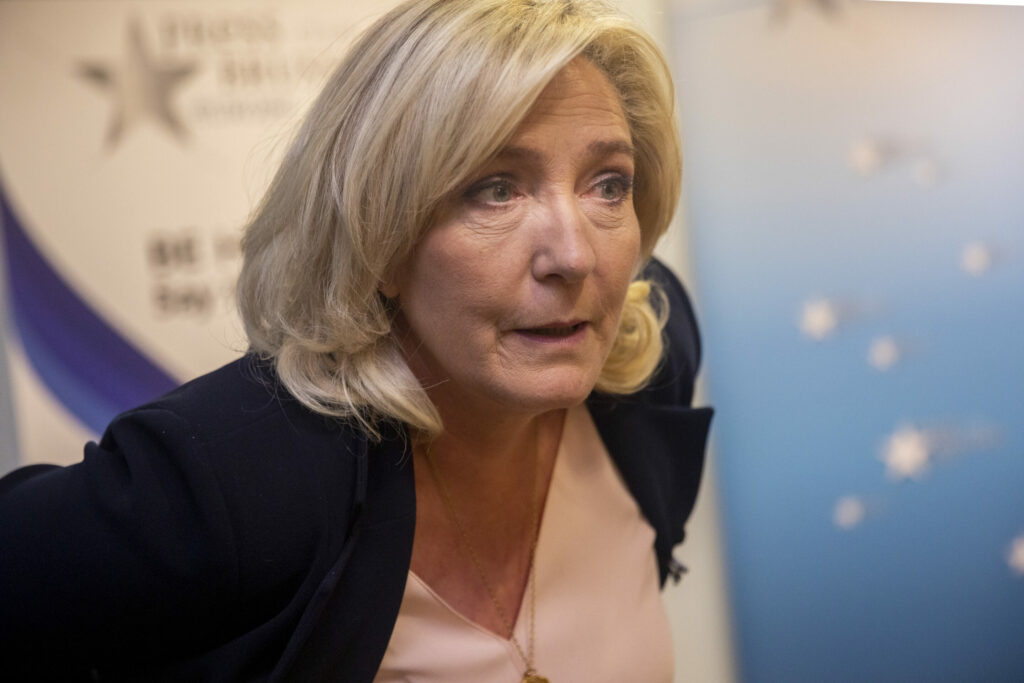The political landscape in France was rocked on Monday by the conviction of Marine Le Pen, the Rassemblement National (RN) leader and figurehead of the French far-right.
Convicted of funnelling public funds from the European Parliament into her own party's coffers, Le Pen, along with several party members and the RN itself, now faces significant legal and financial repercussions.
Questions arise while political fallout remains uncertain: Can Jordan Bardella step into her shoes? Will the party fracture or rally? And how will this trial reshape public trust in institutions? Political analyst Benjamin Biard from Centre for Socio-Political Research and Information (CRISP) assesses the potential consequences of this landmark moment in French politics.
What are the eventual consequences of Marine Le Pen’s conviction on Rassemblement National (RN) and the 2027 presidential election?
This conviction is significant and will likely have an impact. The consequences can be considered on several levels.
Regarding her political base, particularly the far-right electorate, I’m not convinced the fallout will be overwhelmingly negative. On the contrary, this conviction could even radicalise some of her supporters. We may witness a wave of anger and a rallying effect behind the National Rally, especially among those who feel the condemnation is unjust or politically motivated.
Other voters might be disappointed and betrayed – particularly those who believed in the party’s longstanding message of fighting corruption and clientelism.
This conviction reshuffles the cards for the party and the 2027 presidential race. Until now, we assumed Marine Le Pen is most likely the presidential candidate (with Jordan Bardella positioned as a potential Prime Minister). However, particularly given the immediate or provisional execution, her conviction has cast doubt on the viability of that strategy.
The main question remains: who can replace Marine Le Pen as a presidential candidate? Is it going to be Jordan Bardella? He seems to be the frontrunner and Le Pen's personal choice – though she hasn’t said so directly, likely due to the pending appeal.
Still, Bardella does not have unanimous support within the party. So yes, we might be heading toward a party reshuffling.
Let’s also not forget that alongside Le Pen and the twenty others convicted, the Rassemblement National has been fined €2 million. This could significantly impact the party’s operations – financing is, after all, the lifeblood of political activity.
The RN has accused French justice of being politically weaponised (or politicised). Does this rhetoric resonate with the party’s base?
Absolutely. This is not a new narrative – Le Pen and the RN have long positioned themselves as victims of a politicised judiciary. Her popularity and the party’s standing have remained relatively stable throughout this trial, partly because media coverage has been moderate up to this point.
Her claim of a 'political trial' will likely reinforce support among her base. It could even deepen their loyalty and further solidify the party’s anti-system stance.
Is the RN simply facing the consequences of the republican laws it claims to respect?
Marine Le Pen is trying to spin the verdict to fuel her anti-establishment narrative. It’s a strategic communication tool. Of course, this doesn’t mean French justice is politicised.
In a broad sense, the judges and magistrates relied on documented evidence, including misuse of EU funds. Legally, the court was within its rights to enforce a provisional execution of the sentence. This is a legal possibility, and the judge justified the decision. Whether we agree or not, the mechanism is enshrined in law and does not result from a political vendetta.
If there’s any responsibility to be found, it lies more with legislators who, in the past, passed laws allowing this kind of sentencing – not the judges who enforce them.
That said, public perception is another matter. Some may view this as a political trial, seeing justice as a tool of the government. This perception – accurate or not – can be powerful.
Do you see a parallel with the U.S. and Donald Trump’s legal troubles?
In some ways, yes. Just as Trump’s legal issues mobilised part of the American electorate, we might see similar dynamics in France. A segment of the public may interpret this verdict as persecution, which can galvanise support.
Regarding Bardella, could he become the party's true face, or will he be seen as a temporary stand-in without historical authority?
Currently, Bardella is the President of the RN, and he enjoys substantial popularity within the party. However, he does not have unanimous backing to be the presidential candidate.
If Le Pen’s appeal fails – or if she decides not to run – Bardella seems the most likely successor. Still, his path to the presidency is far from certain. He lacks the experience of Le Pen, who has already run three presidential campaigns. His political career is still relatively young, and his stature does not yet match hers.
Could this trial reinvigorate Marine Le Pen’s anti-system appeal and the 'the people vs. the elite' narrative?
It’s too early to say definitively, but she will undoubtedly lean into that narrative. Her response to the conviction – whether through media appearances, public demonstrations, or strategic silence – will shape the public’s reaction.
She was expected to speak on TF1 at 20:00 on Monday, and then we’ll have a clearer sense of her strategy.
Finally, what’s your broader view of the 2027 presidential landscape?
Until now, one of the only certainties for 2027 was the likely Le Pen-Bardella ticket. Today, even that is uncertain.
Who will represent each ideological faction? Jean-Luc Mélenchon may still represent the radical left, but beyond that, everything remains fluid. Two years is a long time in politics. Much will depend on the next few days and weeks, especially within the National Rally. The political landscape is already shifting – and will likely continue to evolve rapidly.

